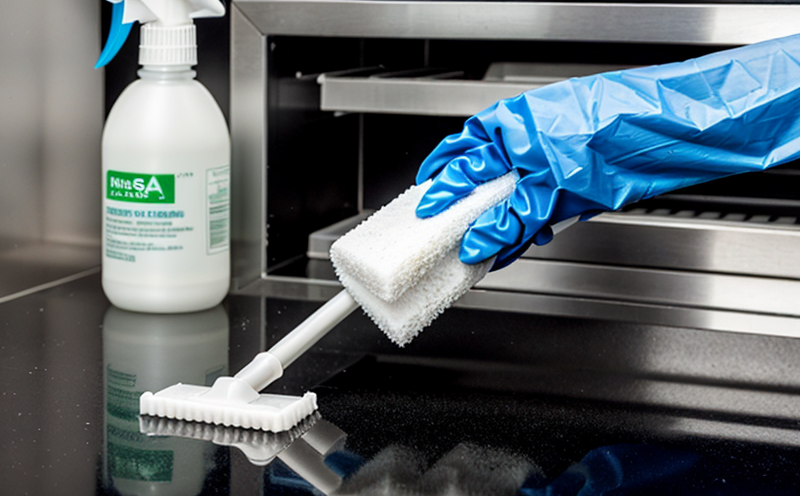DIN EN ISO 20743 Odor Control Testing of Hygiene Plastics
The DIN EN ISO 20743 standard is pivotal in ensuring that hygiene plastics, particularly those used in the production of items like medical devices, baby bottles, and other household goods, meet stringent odor control requirements. This service focuses on validating that these materials do not release volatile organic compounds (VOCs) or other odorous substances under specified conditions. The testing process involves controlled exposure to a series of gaseous environments designed to simulate real-world storage and handling scenarios.
The standard specifies procedures for the evaluation of odor properties, including quantitative measurements using gas chromatography-mass spectrometry (GC-MS), as well as qualitative assessments by trained sensory panels. This dual approach ensures both objective data and subjective perception are considered in the final assessment. Compliance with this international standard is crucial for manufacturers aiming to ensure product safety and meet regulatory requirements.
The testing protocol includes detailed instructions on specimen preparation, exposure conditions, and evaluation techniques. Specimens are typically exposed to a range of gaseous environments that simulate storage conditions under various temperature and humidity levels. The test duration varies depending on the specific material and its intended use. After exposure, sensory panels evaluate the specimens for any detectable odors using standardized procedures.
The acceptance criteria for this test are based on both quantitative GC-MS results and qualitative sensory panel scores. If a specimen fails to meet these criteria, it may be subjected to further analysis or additional testing cycles to identify potential issues. This service is essential for quality managers and compliance officers looking to ensure their products comply with international standards and maintain consumer trust.
Compliance with DIN EN ISO 20743 can significantly enhance the reputation of a company in the hygiene plastics sector, as it demonstrates a commitment to product safety and environmental responsibility. This standard is widely recognized by regulatory bodies around the world, making compliance not only beneficial for market access but also for enhancing brand image.
Industry Applications
| Application Area | Description |
|---|---|
| Baby Bottles and Nursing Accessories | Evaluating the odor control of materials used in baby bottles, pacifiers, and other nursing accessories to ensure they do not impart unwanted odors. |
| Medical Devices | Testing the odor properties of materials used in medical devices like catheters, syringes, and surgical instruments to prevent contamination and ensure patient safety. |
| Toys and Children's Products | Ensuring that toys and other children’s products made from hygiene plastics do not release harmful odors or VOCs that could be detrimental to a child's health. |
| Hospital Supplies | Evaluating the odor control of materials used in hospital supplies like IV bags, catheters, and other medical equipment to maintain sterility and patient safety. |
| Food Contact Surfaces | Testing the odor properties of materials that come into contact with food products to ensure they do not impart odors or flavors that could affect product quality. |
| Hygiene Products | Evaluating the odor control of materials used in hygiene products like diapers, sanitary pads, and other personal care items to prevent unwanted odors. |
| Dental Instruments | Ensuring that dental instruments made from hygiene plastics do not release harmful odors or VOCs during prolonged use. |
The DIN EN ISO 20743 standard is particularly relevant to industries where consumer safety and product quality are paramount. By ensuring that the materials used in these applications meet stringent odor control standards, manufacturers can enhance the overall safety and effectiveness of their products.
Customer Impact and Satisfaction
Implementing DIN EN ISO 20743 odor control testing provides significant benefits to customers by ensuring that hygiene plastics do not release any odorous compounds that could affect product quality or consumer health. This service helps manufacturers maintain a high standard of product safety, which is critical in sectors like medical devices and food contact surfaces.
By adhering to this international standard, companies can enhance their reputation for quality and reliability, thereby increasing customer satisfaction and loyalty. The testing process ensures that materials used in hygiene plastics meet the highest standards of odor control, which is essential for maintaining consumer trust and meeting regulatory requirements.
The results of DIN EN ISO 20743 testing provide valuable insights into the performance of materials under various conditions, allowing manufacturers to make informed decisions about product design and material selection. This service also helps companies stay ahead of changing regulations and industry trends, ensuring they remain competitive in the global market.
Customer satisfaction is further enhanced by the rigorous testing process, which ensures that only products meeting stringent odor control standards are released to the market. This commitment to quality not only improves customer trust but also helps manufacturers meet sustainability goals by minimizing waste and ensuring product longevity.
International Acceptance and Recognition
The DIN EN ISO 20743 standard is widely recognized and accepted across numerous countries, making it a crucial requirement for companies operating in the hygiene plastics sector. This international acceptance ensures that products tested under this standard can be easily exported to various markets without additional testing.
Many regulatory bodies around the world have adopted DIN EN ISO 20743 as part of their quality assurance processes, further emphasizing its importance in the industry. Compliance with this standard demonstrates a company's commitment to maintaining high standards of product safety and environmental responsibility.
The acceptance of DIN EN ISO 20743 extends beyond national borders, ensuring that manufacturers can confidently meet global market demands. This recognition also enhances the reputation of companies that comply with this standard, making them more attractive to potential partners and customers worldwide.
By adhering to this international standard, companies can ensure that their products meet the highest standards of odor control, thereby enhancing customer satisfaction and trust. The acceptance of DIN EN ISO 20743 also helps manufacturers stay ahead of changing regulations and industry trends, ensuring they remain competitive in the global market.





